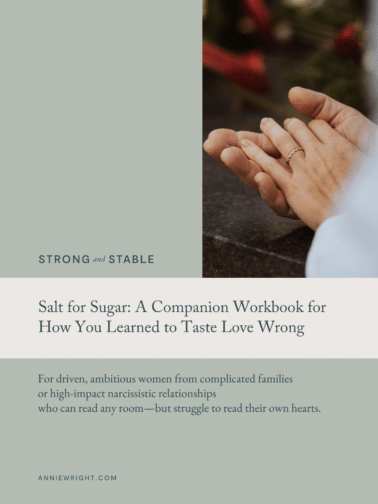TL;DR –Fear hijacks trauma survivors differently—when your boss says "we need to talk" or paperwork shows a flaw, your nervous system might respond as if your survival is threatened, because that's exactly what it learned in childhood. For those with relational trauma, the past collapses into present: suddenly you're not a competent adult but that powerless child whose father left them on a highway, whose mother threatened abandonment, whose safety depended on perfect performance. This isn't weakness or overreaction—it's a nervous system that learned early to be hypervigilant, scanning constantly for danger because danger was real and present throughout your development.
The four tools for managing trauma-triggered fear address both body and mind: reaching out to someone whose regulated nervous system can help calm yours, moving your body to discharge cortisol while using heat to restore circulation, playing out worst-case scenarios to reveal their actual impossibility, and taking strategic action to address what you can control. These aren't just coping mechanisms but reparative practices—each time you successfully regulate through fear without childhood's chaos or abandonment following, you're teaching your nervous system that the present is different from the past, that you have resources now you didn't have then, and that fear, while uncomfortable, is survivable.
“Honey, Mom has COVID.”
“I’m so sorry, but we need to let you go.”
“I need to schedule time to talk with you. Immediately.”
“Can you come into my office for a minute? I need to talk to you about your daughter’s lab work.”
Fear. Be it perceived or actual, an immediate or imaginary threat absolutely feels terrible.
Fear hijacks our brains and bodies, flooding our limbs and chest with cortisol and making us feel like there’s fiery heat coursing through our limbs and into our throats.
We panic. Flounder, acting impulsively or taking rash action to do something. Anything.
We freeze. Shake. We may start sobbing.
Fear impacts us all. But sometimes it impacts us disproportionately.
Take, for instance, those sentences at the top of this essay.
Do you feel scared and fearful of just hearing them?
Or do you feel fairly neutral, noticing that they’re not ideal intellectually but also not really feeling anything in your body when you read them?
It’s not uncommon for those who come from relational trauma histories to have disproportionately higher and more severe fear reactions to those sentences (or to actual parallel lived out experiences).
In today’s essay, I talk about why, and also share four helpful tools to cope when fear triggers your own trauma.
Why might fear impact someone from a relational trauma history more?
Relational trauma – the experience of repeated, protracted events or situations that overwhelm an individual’s ability to respond, most usually taking place in a relationship where there’s a large imbalance of power (such as parent and child) – is an experience with impacts that can linger long after the original trauma has ended.
One such example of a lingering impact is the disproportionate response relational trauma survivors might have when threats and fear – be they perceived or actual – take place.
Why?
Because of several reasons.
Often those who come from relational trauma backgrounds may have lived through actual events that threatened (or seemed like they threatened) their survival.
Their nervous system was taxed and taught at an early age to be hypervigilant, leaving them predisposed to overly activated nervous systems and a sensitive “scanning” system for danger, a body and mind quick to race to fear and, in fact, flood with it.
Moreover, for those who come from relational trauma backgrounds, the past may quickly become present.
What do I mean by this?
The boss who asks to speak with you collapses time and suddenly you feel as powerless and helpless as you did at 10 years old when your father dropped you off on a highway and sped off. Leaving you alone. Leaving you vulnerable.
The flaw you find in your paperwork plunges you into catastrophe. You know you’ll end up in jail. And be utterly ruined for accidentally not crossing every T and dotting every I. You feel like your life is over.
These are just a few moments when perceived fear feels like actual fear to our minds and bodies. Time collapses and our past traumatic experiences show up, warping our perception of the present.
Curious if you come from a relational trauma background?
Take this 5-minute, 25-question quiz to find out — and learn what to do next if you do.
START THE QUIZIf this has happened to you, if this ever does happen to you, here are four helpful tools you can use when fear triggers your own trauma.
And please note: you don’t have to come from a relational trauma background to benefit from these tools. Anyone can benefit because fear is universal.
1. Talk to someone soon who cares about you and whose own nervous system is not hyper-aroused.
Be it your therapist, your spouse, your best girlfriend, your pastor, your yoga teacher, your child’s daycare director, talk to someone – anyone – who loves you and knows you and whose own nervous system is grounded and regulated enough to be able to help you.
To give you perspective. To provide, perhaps, a more accurate and realistic, and pragmatic view of what’s going on.
Soothing our nervous systems by relying on others isn’t weak. It’s smart.
And it’s particularly smart when we’re so flooded with fear that we’re catastrophizing, and unable to access our brain’s prefrontal cortex in the ways we really need to.
Pick up the phone, send a text, run over (in a mask while standing six feet apart) to your friend’s home.
Do what you need to do to access others’ in your life who can support you and help you regulate.
2. Soothe your body with movement, energy discharge, and heat.
The fear response triggers our amygdala and sends a cascade of hormones through our body, triggering our adaptive fight, flight, or freeze responses.
In order to alleviate your fear, tend to your body and help it discharge the build-up of cortisol and bring back circulation to all parts of you.
Practicing taking deep, shallow breaths. Let yourself release the energy through tears, screaming, pacing. Hop on your Peloton for a 20-minute ride, or challenging yourself to 30 jumping jacks to spike your heart rate.
Movement and expulsion like this can help discharge the pent up fear energy in our body.
And then, soothe and warm your body.
Try climbing underneath your shower and letting the hot water bring circulation back to your cold hands and feet (blood flow to our extremities reduces when our fear response is triggered, less blood flow to the extremities and more blood flow to our organs to ensure our survival).
Turn up the heat in your house and putting on another sweater. Put on your slippers, put on your hat, hold your hands near the heater.
Soothe your body with heat to help yourself regulate again.
3. Play the worst-case scenario with yourself and list all the action steps that would have to happen for that to come true.
Another helpful tool when we find ourselves flooded by fear is to play out the worst-case scenarios with yourself and then list all the action steps that would have to happen for it to come true.
For example, your boss calls you into your office for what you imagine will be a disciplinary conversation. You worry that you will be fired and that you will end up on the street so you panic.
Play it out: Let’s say you really do get fired. Is it true you would end up on the street right away? Is it true you have no savings to tide you over? No way to get another job in a reasonable amount of time?
Is it true that every social support in your life would abandon you and you wouldn’t be able to crash on someone’s couch? What are alllll of the steps that would have to happen for your worst-case scenario to come to pass? And now ask yourself: is it really likely that each and every one of those things will happen?
For most of us, the answer is no. And so this tool can be a very helpful cognitive exercise to play with ourselves when we are flooded with fear and our trauma is triggered.
4. Get actionable.
For many of us, nothing soothes our anxiety and fear quite like getting actionable.
Anxiety and fear can dissipate in the face of strategic action to remedy the situation we’re most afraid of.
Worried about your paperwork gap? Consult a lawyer. Scared about your child’s lab work prognosis? Get a second opinion and ask for more tests to be run. Worried your boss is upset with you? Check out that assumption with them. Ask for a performance improvement plan and regular meetings to track your progress.
Of course, with some things in life, there are few ways we imagine we can get actionable. Such as in the face of life or death or when we’re powerless over the actions of another. But maybe, just maybe there’s some small way you can still get actionable? Even if it’s sending money to cover someone’s medical costs, or boxing up Christmas gifts for their kids and dropping them on the porch, or gifting someone some therapy sessions to help them process their own fear.
There are few examples I’ve seen where we truly can’t take supportive action in some form to support our fear.
Recalibrating Your Fear Response Through Somatic Trauma Therapy
When fear floods your system and you’re convinced you’ll end up homeless because your boss wants to talk, or in prison because of a paperwork error, you’re not being dramatic—you’re experiencing what happens when a nervous system calibrated to childhood danger tries to navigate adult challenges. Understanding what you can do when you’re feeling dysregulated becomes essential for distinguishing between perceived and actual threats, between past ghosts and present realities.
Your trauma-informed therapist recognizes that your outsized fear responses aren’t character flaws but evidence of a nervous system that learned to survive by assuming danger everywhere. When you were young and actually powerless, when caregivers’ moods meant real consequences, when small mistakes led to big punishments, your amygdala learned to sound five-alarm fires for any potential threat. This hypervigilance kept you safe then; now it exhausts you with false alarms.
The therapeutic work involves both cognitive and somatic interventions because fear lives in your body as much as your mind. Your therapist might guide you through the four-tool protocol in session: identifying who in your life can co-regulate with you (building your support network), practicing discharge movements and self-soothing with heat, walking through catastrophic thinking to reveal logical impossibilities, and brainstorming actionable steps. They’re teaching your nervous system the difference between feeling unsafe and being unsafe.
Together, you practice these tools repeatedly until they become automatic. When fear spikes, you learn to pause and ask: “Is this a now-problem or a then-problem?” You identify body sensations that signal time collapse—the specific tightness, cold, or numbness that means old trauma is activating. You develop personalized protocols: maybe it’s calling your friend Sarah whose calm voice grounds you, or twenty jumping jacks followed by a hot shower, or writing out every step between “boss upset” and “homeless.”
Most powerfully, each time you successfully navigate fear without childhood’s catastrophes materializing, you’re updating your nervous system’s threat detection software. You’re proving viscerally that you’re no longer that powerless child, that you have resources, choices, and resilience your younger self could never access. The fear may still arise—that early wiring runs deep—but it no longer controls your life.
Wrapping up…
Finally, as we wrap up this article today I want to remind you that, even though it feels like the world is collapsing, like the world is ending, you have made it through hard times before. You have survived your most terrible, no-good days before, and it’s likely you will survive again.
If you need reminders of how strong you are, and of good things that are still happening in the world and that will likely go on long after this particularly hard chapter has passed, please explore these posts I’ve previously written:
- When life feels impossible. A note from me to you.
- A pep talk for times when you’re struggling.
- A note of encouragement when adulting feels hard.
- Adulting’s not easy and humaning can be hard.
- 101 reasons why it will all be okay.
- 101 self-care suggestions when it all feels like too much.
- 99 uplifting quotes to spark your soul and see you through hard times.
Here’s to healing relational trauma and creating thriving lives on solid foundations.
Warmly,
Annie





